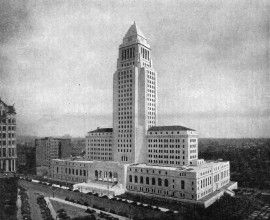L.A. city spat pits Wall Street against unions
by James Poulos | November 6, 2014 2:03 pm
 The latest twist in Los Angeles city politics has shed light on an important new trend in fiscal politics. With new urgency, a coalition of public workers unions has demanded Mayor Eric Garcetti and other city leaders scuttle longstanding financial deals with Wall Street banks.
The latest twist in Los Angeles city politics has shed light on an important new trend in fiscal politics. With new urgency, a coalition of public workers unions has demanded Mayor Eric Garcetti and other city leaders scuttle longstanding financial deals with Wall Street banks.
As the Los Angeles Times reported[1], “L.A. lawmakers voted in August to try to renegotiate the agreements. Now, the unions are stepping up pressure on City Atty. Mike Feuer to file a regulatory complaint alleging that the city was not fully informed of the risks of such deals.”
But in a confidential report sent to lawmakers, Feuer warned these allegations would be so “weak” that courts might even see them as “frivolous,” according to the Times. Caving in to union pressure, he concluded, “can only serve to sully the city’s reputation and credibility in financial circles.”
L.A.’s public pensions negotiations caused the squabble. Garcetti’s team wanted unions to accept pay freezes and higher worker contributions to health care costs. Unions countered that the city was ripped off by bank deals carrying interest rates that could have ended up lower if no deals were signed.
Activists have convinced themselves that an investigation would reveal that Wall Street knowingly bilked the city of L.A. But the city has rejected that idea for a lack of evidence.
The controversy has raised questions about Wall Street’s role in these and other pension struggles, which have become increasingly prominent around the country. Even if the big banks weren’t culpable in the L.A. deals, their related interest in keeping public pensions afloat has ignited a debate of its own.
The big picture
In years past, Wall Street benefited in certain ways from big, complex public pensions. Tuesday’s GOP landslide, however, has underscored the political benefits of opposing them. As big finance has begun to reconsider its position on public unions, the unions themselves have also soured on the relationship.
As CUNY professor Daniel DiSalvo recently explained[2], “[U]nions are more often allies than adversaries with investment firms and consultants. The unions want larger pensions. The money mangers want higher fees. Everyone benefits from more expensive pensions — except the current consumers of government services and future generations.”
In DiSalvo’s home state of New York, for instance, “pensions have become more expensive, the funds have increasingly invested in private equities and other risky asset classes in search of higher returns.”
The Empire State has hardly been alone in this regard, of course. The California Public Employees Retirement System made waves when it pulled $4 billion out of its hedge-fund investments. But the even bigger news was other pensions’ refusal to follow suit; even CalPERS retained its hedge fund managers, according[3] to CNBC.
At the same time, private-sector unions have begun to diverge politically from their public-sector brethren.
Nationwide, public-sector unions have become closely associated with busted state budgets and municipal bankruptcy. But while public workers’ jobs have been sheltered, particularly in states like California, private-sector unionized workers have found themselves without the same level of political protection, especially from Democrats willing to staunchly defend public employees.
Losing Democratic voters
In the Wall Street Journal, Steven Malanga recently showed[4] how that process has played out in traditionally Democrat-dominated states like Illinois, Wisconsin, New Jersey and Rhode Island. In Rhode Island, Democratic gubernatorial candidate Gina Raimondo had to run against public-union largesse to prevail in her close race — much to the consternation[5] of grassroots liberals.
If the Journal could be taken as a guide, however, one recent editorial in the wake of Tuesday’s Republican landslide has revealed[6] Wall Street’s current attitude toward public pensions: “The lesson we hope other politicians, Republicans and Democrats, take is that public-union money can be defeated when the cause is just and you stand your ground.”
Although California has not traditionally been thought of as a state hostile to public-sector employees, even the West Coast may shift along with the rest of the country. Rifts in big cities like Los Angeles, and Gov. Jerry Brown’s stated interest in reducing pension sweeteners, could signal bigger changes to come.
- reported: http://www.latimes.com/local/california/la-me-bank-deals-20141103-story.html
- explained: http://www.publicsectorinc.org/2014/08/the-tie-that-binds-public-employee-unions-and-wall-street/
- according: http://www.cnbc.com/id/102023553
- showed: http://online.wsj.com/articles/steven-malanga-the-emerging-political-divide-between-public-and-private-unions-1414190654
- consternation: http://www.salon.com/2014/11/03/wall_street_democrats_wake_up_call_why_center_right_policies_make_for_horrible_politics/
- revealed: http://online.wsj.com/articles/a-public-union-trouncing-1415165001
Source URL: https://calwatchdog.com/2014/11/06/l-a-city-spat-pits-wall-street-against-unions/